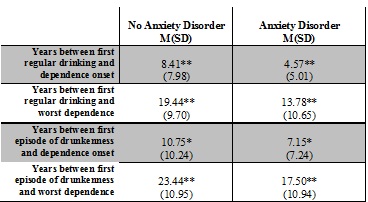The DRAM, Vol. 8(3) – Express lane to drinking problems: Rapid development of alcohol dependence in individuals with anxiety disorders
Past studies consistently have shown that alcohol disorders and anxiety disorders co-occur more frequently than can be explained by chance alone (Boyd et al., 1984; Shaffer et al., 2007). Neurobiological theories of dependence suggest that individuals who have anxiety disorders are especially vulnerable to developing alcohol dependence. This week, the DRAM reviews a study that compared the onset and development of alcohol dependence among individuals with and without anxiety disorders (Kushner et al., 2011).
Methods
- The researchers recruited seventy-eight individuals who had alcohol dependence from an adult inpatient chemical dependency treatment program and assessed them for presence of anxiety disorders. About 54% (n = 42) of the sample met criteria for an anxiety disorder.
- The researchers used the Structured Clinical Interview for DSM-IV (SCID: First et al., 1989), a semi-structured diagnostic interview, to determine the past 4-month presence of the following anxiety disorders:
- panic disorder (with or without agoraphobia);
- agoraphobia without panic;
- social phobia;
- obsessive–compulsive disorder;
- generalized anxiety disorder.
- The researchers measured time elapsed between pre-dependence alcohol milestones (i.e., first drink, first regular drinking, first episode of drunkenness, first time regularly getting drunk) and alcohol dependence milestones (i.e., age first met criteria for alcohol dependence, age at most severe symptoms of alcohol dependence).
Results
- The mean age at which participants who had an anxiety disorder reported their alcohol dependence was at its worst (M = 31.4, SD = 10.99) was about 6 years younger than those who never had an anxiety disorder (M = 37.86, SD = 11.91; F(1,74) = 6.05, p < .05).
- As the Figure shows, individuals who had an anxiety disorder transitioned from regular drinking and from their first episode of drunkenness to alcohol dependence onset significantly faster than did those who did not have an anxiety disorder, (F(1,64) = 7.36, p < .01; F(1,74) = 4.08, p < .05).

Figure. Time in years between pre-dependence alcohol use milestones and alcohol dependence. *F-test indicates means significantly different, p<.05; **F-test indicates means significantly different, p<.01. Click image to enlarge.
Limitations
- The study did not measure whether total amount of alcohol consumed between the various milestones measured differed between those with and without an anxiety disorder. If drinking quantity varied by anxiety disorder status, it is possible that differences in drinking quantity, not anxiety, affected time to dependence.
- The SCID only measured presence of anxiety in the past 4 months, making it difficult to assess whether participants’ anxiety preceded their alcohol dependence or was a potential consequence of that dependence.
- The SCID used retrospective self-report of disorder onset, which is vulnerable to memory errors and biases.
Conclusions
The researchers found that anxiety-disordered individuals transitioned more quickly from regular drinking and first drunken episode to being dependent on alcohol than individuals who did not have anxiety disorders. Neurobiological theories of alcohol dependence suggest that it results from decreasing release of dopamine over extended periods of alcohol use (Koob & LeMoal, 2008). People who have anxiety disorders might be particularly vulnerable to this cycle, because their dopamine-stress response already is dysregulated, effectively giving them a “head start” in developing symptoms of dependence. This dysregulation might explain why fewer instances of interaction with alcohol are associated with risk for dependence among those who have experienced anxiety disorders.
-Kat Belkin
What do you think? Please use the comment link below to provide feedback on this article.
References
First, M., Spitzer, R., Gibbon, M., & Williams, J. (1989). Structural Clinical Interview for Axis-I DSM-IV Disorders, Patient Edition (SCID-I/P Version 2.0). New York, NY: New York State Psychiatric Institute.
Koob, G. F., & Le Moal, M. (2008). Addiction and the brain antireward system. Annual Review of Psychology, 59, 29–53.
Kushner, M.G., Maurer, E., Menary, K., Thuras, P. (2011). “Vulnerability to the rapid (“telescoped”) development of alcohol dependence in individuals with anxiety disorder.” Journal of Studies of Alcohol and Drugs, 72(6), 1019-27.